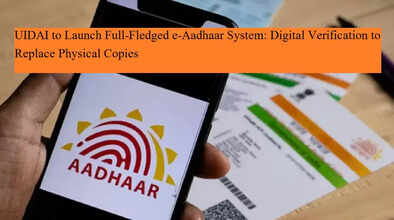UIDAI to Launch Full-Fledged e-Aadhaar System: Digital Verification to Replace Physical Copies

The Unique Identification Authority of India (UIDAI) is preparing to take a major step toward Digital India by launching a fully digital e-Aadhaar system. This upcoming feature will allow QR code-based Aadhaar verification, eliminating the need for physical copies for most official and private transactions.
With Aadhaar already serving as the most important identity document in India, this move will simplify verification, save time, and reduce the risk of lost or damaged documents.
Aadhaar: India’s Key Identity Document
Since its launch, Aadhaar has become the primary proof of identity and address for a wide range of services:
-
Government services: Subsidies, pensions, scholarships, and welfare schemes
-
Banking and financial services: Account opening, KYC verification, and loan processing
-
Private services: SIM card activation, insurance purchases, and utility connections
Currently, citizens are required to submit hard copies or printed versions of their Aadhaar card for most verifications. Even with downloadable e-Aadhaar PDFs, many agencies still demand a physical copy.
The new e-Aadhaar ecosystem is designed to change that.
How the New e-Aadhaar System Will Work
UIDAI’s digital-first verification process will rely on secure QR codes that can be scanned by government and private agencies to confirm an individual’s Aadhaar credentials.
Key features include:
-
QR Code-Based Verification
-
Agencies can scan the QR code on the e-Aadhaar to verify identity instantly.
-
No physical Aadhaar card is required for the process.
-
-
Secure and Tamper-Proof
-
The QR code will carry encrypted information directly linked to UIDAI’s database.
-
Reduces the risk of fraud or misuse of photocopied Aadhaar cards.
-
-
Convenience for Citizens
-
Citizens can carry e-Aadhaar on smartphones or download it anytime from the UIDAI portal.
-
Saves time in government offices, banks, and private service centers.
-
-
No Risk of Loss or Damage
-
Digital storage ensures documents remain safe and accessible at all times.
-
Benefits for Citizens and Institutions
The digital e-Aadhaar system will bring several benefits:
-
Faster processing for KYC, government services, and financial transactions.
-
Reduced dependency on paper copies, lowering the risk of lost documents.
-
Enhanced data security, as QR-based verification eliminates fake or tampered copies.
-
Supports Digital India by promoting paperless identity management.
Banks, telecom companies, and government offices are expected to integrate the e-Aadhaar verification system quickly after its launch, ensuring a seamless transition from physical to digital verification.
A Step Toward a Paperless India
This upcoming e-Aadhaar system is part of UIDAI’s ongoing digital transformation initiatives.
-
Earlier initiatives like Virtual ID (VID) and Masked Aadhaar already enhanced security and privacy.
-
The new fully digital verification system takes the next step toward eliminating physical document dependency.
Once rolled out, citizens can expect most Aadhaar-based services to work instantly with just a smartphone, making everyday tasks faster, safer, and hassle-free.
Bottom Line
The full-scale e-Aadhaar launch by UIDAI will mark a major milestone for Digital India. By enabling QR code-based verification and removing the need for physical Aadhaar copies, it will make identity verification simpler, faster, and more secure for millions of citizens.
For individuals and businesses alike, this shift to a fully digital Aadhaar ecosystem will save time, paperwork, and the risk of fraud—bringing India a step closer to a paperless future.

